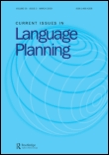
Current Issues in Language Planning
Scope & Guideline
Advancing Knowledge in Linguistics and Education
Introduction
Aims and Scopes
- Language Policy and Planning:
The journal emphasizes the study of language policy and planning, investigating how language is managed in educational systems and how these policies affect linguistic diversity and identity. - English Medium Instruction (EMI):
A significant focus area is on English as a Medium of Instruction in higher education, analyzing its implications for language policy, educational practices, and the experiences of students and educators. - Multilingual Education:
The journal explores multilingual education strategies, including the challenges and successes of implementing language policies that support bilingual or multilingual learning environments. - Cultural and Social Dynamics of Language:
Research often delves into the socio-cultural implications of language planning, examining how language policies intersect with issues of identity, migration, and community dynamics. - Agency in Language Policy:
A unique contribution of the journal is its focus on the role of individual and collective agency in language policy enactment, highlighting how stakeholders navigate and influence language planning processes.
Trending and Emerging
- Internationalization of Higher Education:
There is a growing focus on the internationalization of higher education, particularly regarding the implementation of English Medium Instruction (EMI) and its impacts on local languages and educational practices. - Politics of Distraction in Language Policy:
Emerging research is increasingly examining the 'politics of distraction' within language policies, addressing how certain narratives and ideologies can detract from meaningful language planning and implementation. - Digital Spaces and Language Planning:
The influence of digital spaces on language planning and education is gaining attention, with studies exploring how technology mediates language use and policy in educational contexts. - Intersectionality in Language Policy:
An emerging theme is the intersectionality of language policy, where researchers are investigating how various social factors—such as race, class, and gender—interact with language planning and policy outcomes. - Heritage Language Maintenance:
Research on the maintenance and revitalization of heritage languages is trending, emphasizing the importance of community involvement and policy support in sustaining linguistic diversity.
Declining or Waning
- Traditional Language Education Policies:
There appears to be a waning interest in conventional language education policies that do not address the complexities of multilingualism and the realities of contemporary globalized contexts. - Focus on Minority Languages:
While still relevant, the explicit focus on minority languages and their rights within language policy frameworks seems to be less prevalent compared to the growing emphasis on English and global languages. - Static Language Ideologies:
Research exploring static or traditional language ideologies is declining, as the field increasingly recognizes the need for dynamic and context-sensitive approaches to language policy. - Historical Perspectives on Language Policy:
The journal has seen a reduction in publications analyzing historical language policy frameworks, suggesting a shift towards contemporary applications and immediate challenges.
Similar Journals
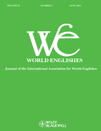
World Englishes
Diving Deep into the Richness of English Variants Across CulturesWorld Englishes, a leading peer-reviewed journal published by WILEY, serves as a vital platform for interdisciplinary research that explores the nuances of English language use around the globe. With an ISSN of 0883-2919 and an E-ISSN of 1467-971X, this journal has significantly impacted the fields of Anthropology, Linguistics, Sociology, and Political Science, boasting a Q1 ranking in each of these categories as of 2023. The journal’s focus extends from theoretical explorations to practical implications of English as a global lingua franca, making it indispensable for scholars, educators, and practitioners alike. Spanning over four decades of research from 1981 to 2024, World Englishes is dedicated to advancing our understanding of the sociolinguistic dynamics at play in various English-speaking communities. With robust Scopus rankings—including the 92nd percentile for Language and Linguistics—this journal not only underscores the significance of English globally but also fosters dialogue and engagement among diverse voices in the academic landscape. Embrace the opportunity to contribute to or engage with the cutting-edge discussions presented in this renowned publication.

Colombian Applied Linguistics Journal
Bridging theory and practice in applied linguistics.Colombian Applied Linguistics Journal, published by UNIV DISTRITAL FRANCISCO JOSE DE CALDAS, serves as a vital platform for the advancement of knowledge in the field of applied linguistics, particularly within the Latin American context. Since its inception in 2003, the journal has embraced an Open Access model, ensuring that cutting-edge research is readily accessible to scholars, practitioners, and students alike. With a focus on topics including language acquisition, language policy, and bilingual education, the journal contributes to the understanding of linguistic diversity and its practical applications in educational settings. The Colombian Applied Linguistics Journal is dedicated to fostering dialogue and disseminating research that bridges theory and practice, thus playing a crucial role in shaping contemporary discourses in linguistics and education. Located in Bogotá, Colombia, the journal encourages submissions from both national and international authors, enhancing its reputation as a key player in the global linguistic community.
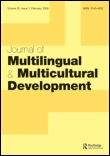
JOURNAL OF MULTILINGUAL AND MULTICULTURAL DEVELOPMENT
Exploring the Nexus of Language and CulturePublished by Routledge Journals, Taylor & Francis Ltd, the JOURNAL OF MULTILINGUAL AND MULTICULTURAL DEVELOPMENT has established itself as a premier platform for scholarly discourse in the fields of cultural studies, linguistics, and education since its inception in 1980. With a significant focus on the multifaceted nature of language and culture, this journal offers invaluable insights that contribute to our understanding of multilingualism and multiculturalism in a globalized world. The journal commands an impressive impact, holding Q1 rankings across three critical categories as of 2023, reflecting its influence within the academic community: 22nd percentile in Cultural Studies, 45th in Linguistics and Language, and 215th in Education. Relevant researchers, professionals, and students are encouraged to engage with groundbreaking research, methodologies, and discussions that highlight the dynamic interconnection of language and culture. To access the journal, please visit Routledge’s dedicated platform, where you can explore a wealth of resources and stay updated on the latest findings up to 2024.
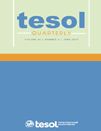
TESOL QUARTERLY
Elevating Pedagogy through Critical Analysis and PracticeTESOL Quarterly, published by Wiley, is a premier academic journal in the fields of Education and Linguistics, noted for its significant contributions to the study of Teaching English to Speakers of Other Languages. Since its inception in 1981, this journal has established itself as a vital platform for researchers and educators, emphasizing empirical studies, innovative teaching practices, and critical reviews that inform policy and pedagogy. With an impressive impact factor, it consistently ranks in the Q1 Quartile across multiple categories in both Education and Linguistics, highlighting its influence and reach within the scholarly community. The journal boasts strong Scopus rankings, placing it in the top 96th percentile among related publications, further affirming its essential role in disseminating cutting-edge research. Although it does not offer open access, TESOL Quarterly remains dedicated to promoting high-quality scholarship that advances the understanding of language education practices globally.
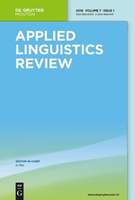
Applied Linguistics Review
Connecting scholars through impactful language studies.Applied Linguistics Review is a leading academic journal published by WALTER DE GRUYTER GMBH, focusing on the dynamic field of linguistics and language studies. With an impressive Q1 quartile ranking in both Linguistics and Language and Social Sciences, the journal positions itself at the forefront of research, making it a crucial resource for scholars and professionals alike. The journal aims to foster scholarly dialogue by publishing high-quality, peer-reviewed articles that explore theoretical frameworks, empirical studies, and innovative methodologies in applied linguistics. Operating from Poland with an international reach, it is committed to advancing knowledge in areas such as language acquisition, language policy, and multilingualism. Its notable performance can be seen in its Scopus rankings, where it stands at #72 out of 1088 in the Arts and Humanities category and #86 out of 1167 in Social Sciences. The Applied Linguistics Review serves as an invaluable platform for researchers, educators, and students to disseminate and engage with cutting-edge research, thereby enhancing their understanding and application of linguistic principles in diverse contexts.
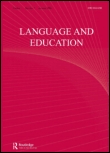
Language and Education
Fostering Excellence in Language Studies and TeachingLanguage and Education is a leading academic journal published by Routledge Journals, Taylor & Francis Ltd, specializing in the intersection of language studies and educational practices. With an impressive Q1 ranking in both Education and Linguistics and Language categories for 2023, it stands out as a crucial resource for researchers, educators, and industry professionals. Covering a wide array of topics pertinent to language acquisition, pedagogical methodologies, and culturally responsive education, this journal supports rigorous scholarship in the field. While not currently offering open access options, its contributions are vital for advancing knowledge and fostering innovation across disciplines. The journal's long-term commitment to excellence is evidenced by its high rankings in Scopus, placing it in the 94th percentile in Language and Linguistics and the 80th percentile in Education. Since its inception in 1987, Language and Education has not only tracked the evolving landscape of language education but has also actively shaped it, making it an indispensable tool for anyone invested in educational research and practice.
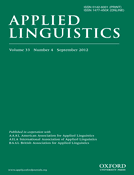
APPLIED LINGUISTICS
Exploring the Nexus of Language and SocietyApplied Linguistics, published by Oxford University Press, is a premier scholarly journal that has significantly contributed to the fields of linguistics and communication since its inception in 1980. With an impressive impact factor and ranked in the top quartile (Q1) in both Communication and Linguistics and Language categories, Applied Linguistics is recognized for its rigorous peer-reviewed articles that explore the intersections of language, society, and cognition. The journal enjoys a remarkable position in the Scopus rankings, placing it among the top 2% of publications in its discipline. Researchers, professionals, and students benefit from its comprehensive scope, which encompasses innovative research on language acquisition, discourse analysis, and applied linguistics methodologies. Although not an open access journal, its commitment to advancing knowledge and fostering academic discussions makes it an indispensable resource for anyone interested in the critical role of language in various contexts.
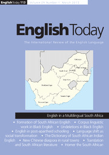
English Today
Fostering Academic Excellence in Language ResearchEnglish Today is a premier academic journal published by Cambridge University Press, renowned for its contributions to the field of linguistics and language since its inception in 1985. With an impressive impact factor and categorized in the top Q1 quartile for both linguistics and language categories, it ranks notably within the 84th percentile for Arts and Humanities and 82nd percentile for Social Sciences in Scopus rankings. The journal serves as a vital platform for researchers, professionals, and students, offering cutting-edge research, insightful reviews, and critical discussions on contemporary issues in English language studies. Although it is not open access, the journal maintains a commitment to academic rigor and relevance, making it an essential resource for those dedicated to advancing their understanding of English language dynamics and its implications in various socio-cultural contexts. With its editorial board comprising leading experts, English Today promises to continue shaping the discourse in linguistics and language studies through to 2024 and beyond.

Languages
Connecting scholars to the heartbeat of language research.Languages, published by MDPI, is a prestigious open-access journal dedicated to the field of Linguistics and Language studies. Since its inception in 2016, this journal has rapidly established itself as a leading platform for high-quality research, achieving an impressive Q1 ranking in 2023 and standing out in both the Arts and Humanities as well as the Social Sciences categories with significant percentile rankings (76th and 74th respectively). Based in Switzerland, Languages fosters an international community of scholars who are committed to exploring the multifaceted dimensions of language, from theoretical frameworks to practical applications. With a robust e-ISSN of 2226-471X, the journal prioritizes accessibility, allowing researchers, professionals, and students to freely engage with cutting-edge research and insights. By bridging the gap between theory and practice, Languages plays a crucial role in advancing our understanding of linguistic phenomena, making it an invaluable resource for anyone invested in the study of language.
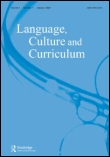
Language Culture and Curriculum
Advancing Language Education Through Cultural InsightsLanguage Culture and Curriculum is a premier academic journal published by Routledge Journals, Taylor & Francis Ltd, dedicated to advancing knowledge in the fields of Education and Linguistics. With a distinguished history since 1988 and converging through to 2024, this journal is highly regarded, reflecting its exemplary standing with a 2023 Q1 ranking in both Education and Linguistics. Currently among the top 3% of publications in Language and Linguistics and ranked 27th in Social Sciences, Language Culture and Curriculum fosters the exploration of language education within diverse cultural contexts. Through rigorous peer-reviewed research, it serves as an essential platform for researchers, educators, and policymakers alike, promoting innovative practices and theoretical frameworks in language teaching and curriculum development. Although it does not offer Open Access, the journal remains an invaluable resource in academic circles, supporting scholarly discourse and advancing educational methodologies.